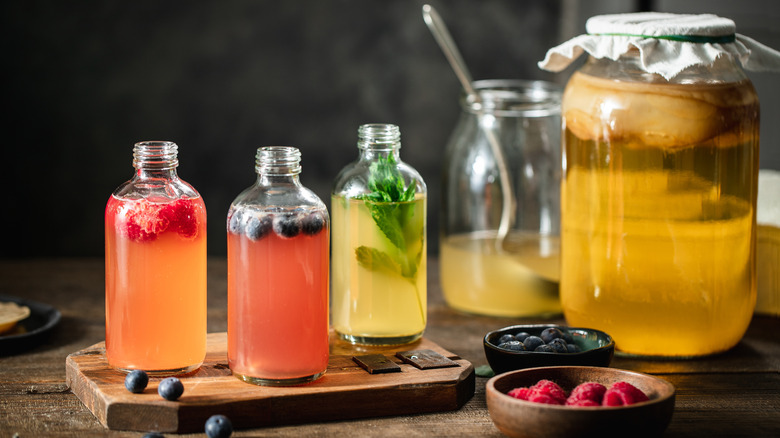The Unexpected Side Effect Of Drinking Kombucha
Kombucha's popularity has surged over the past several years, finding its way into mainstream grocery stores. Some health food stores will offer their home-brewed kombucha on tap, and you can find kombucha brew kits to enjoy this fermented drink at home. Some people swear by the health benefits of kombucha, from detox to limiting inflammation to protecting your heart, according to Cleveland Clinic. Yet there isn't a whole lot of research backing these claims.
People are turning to kombucha because they know that fermented foods (like kimchi, tempeh, and kombucha have good bacteria that can improve their gut microbiome (via The Conversation). During the fermentation process, bacteria create biogenic amines — particularly histamine and tyramine — to break down amino acids. If histamines sound familiar to you, you'll know that they're typically associated with allergy symptoms. People who lack a specific enzyme to digest the histamines in kombucha could experience itching, runny nose, headaches, or fatigue.
Histamine intolerance and kombucha
According to Allergy UK, people with histamine intolerance don't have the digestive enzyme diamine oxidase. When they eat foods that contain these biogenic amines, these individuals may feel allergy symptoms 30 minutes or more after eating them. This reaction could occur from drinking kombucha or other fermented foods and drinks such as wine, beer, sauerkraut, kefir, or miso.
This histamine intolerance could also cause gastrointestinal symptoms, according to Healthline. Symptoms like abdominal pain, bloating, or nausea often indicate histamine intolerance. Histamine intolerance can also cause your menstrual cycle to become irregular, but you could also develop high blood pressure or dizziness. People with gastrointestinal disorders (such as celiac disease or irritable bowel syndrome) are more likely to develop a histamine intolerance. Although there isn't a specific test for histamine intolerance, you might want to take a look at your kombucha habit to see if this fermented food is to blame for your allergy-like symptoms.
Other side effects of kombucha
As more people develop their home-brewed kombucha, some kombucha could become contaminated or over-fermented, according to Medical News Today. These homebrews might not be pasteurized like store-bought kombucha, so harmful bacteria could grow — just like healthy bacteria. This could make it unsafe to drink, especially if you have a weakened immune system. Look for kombucha that's been pasteurized, or at least pasteurized before the bacteria is added.
Remember that kombucha is made from brewed tea and sugar. People who are sensitive to caffeine might want to find kombucha brews that are made from herbal teas that are caffeine-free. Some kombucha drinks have added sugar or juices that can add extra calories and raise your blood sugar. Check the label on your favorite kombucha for a low-sugar option. Although it's rare, kombucha could be toxic to your liver, especially if you have a liver condition. Because there isn't an abundance of research on the benefits or side effects of kombucha, it's best to keep your kombucha habit to about one or two 8-ounce servings a day.



